Unit 5 Nelson Mandel -- a modern hero Grammar (2)- Attributive clause
文档属性
| 名称 | Unit 5 Nelson Mandel -- a modern hero Grammar (2)- Attributive clause | 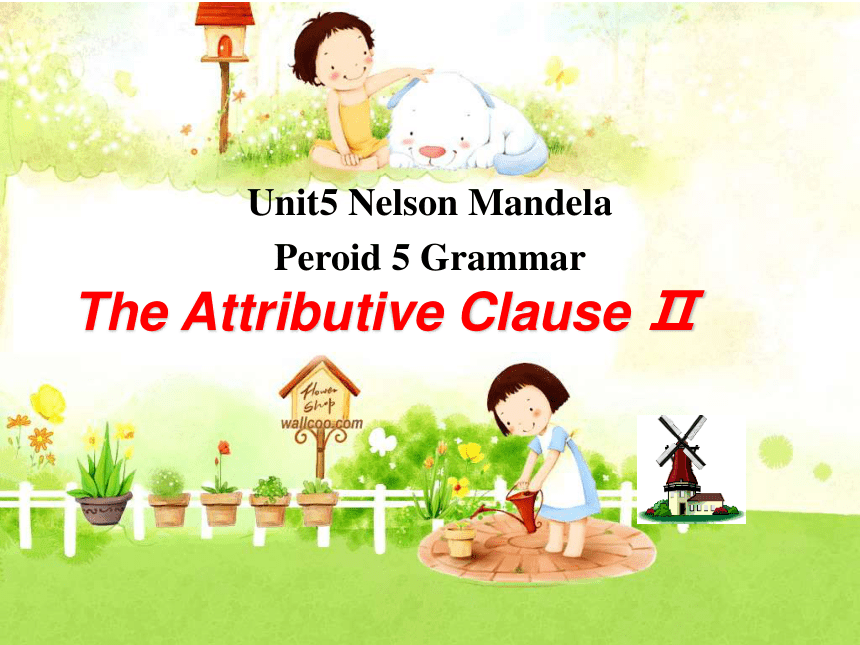 | |
| 格式 | zip | ||
| 文件大小 | 846.5KB | ||
| 资源类型 | 教案 | ||
| 版本资源 | 人教版(新课程标准) | ||
| 科目 | 英语 | ||
| 更新时间 | 2012-11-09 18:20:04 | ||
图片预览

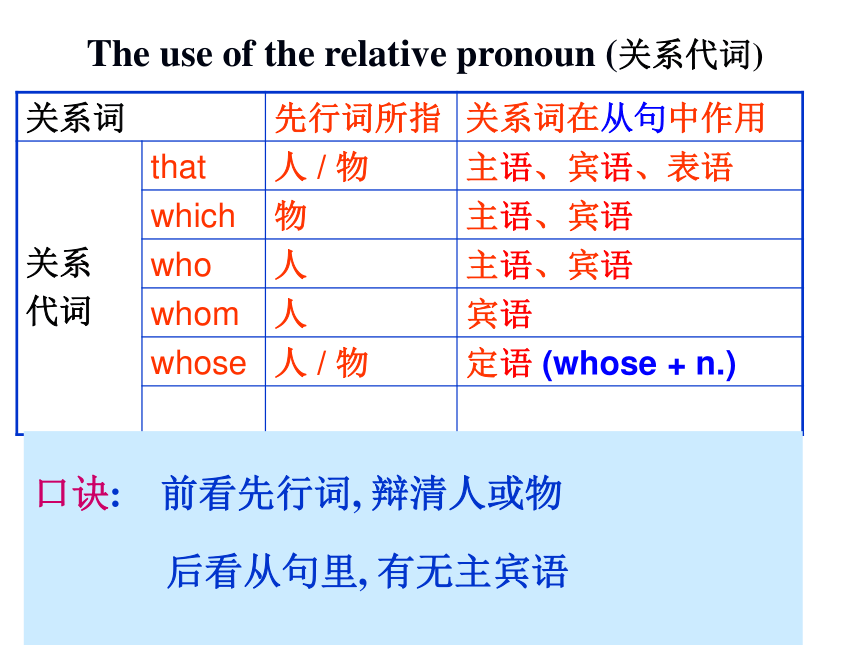
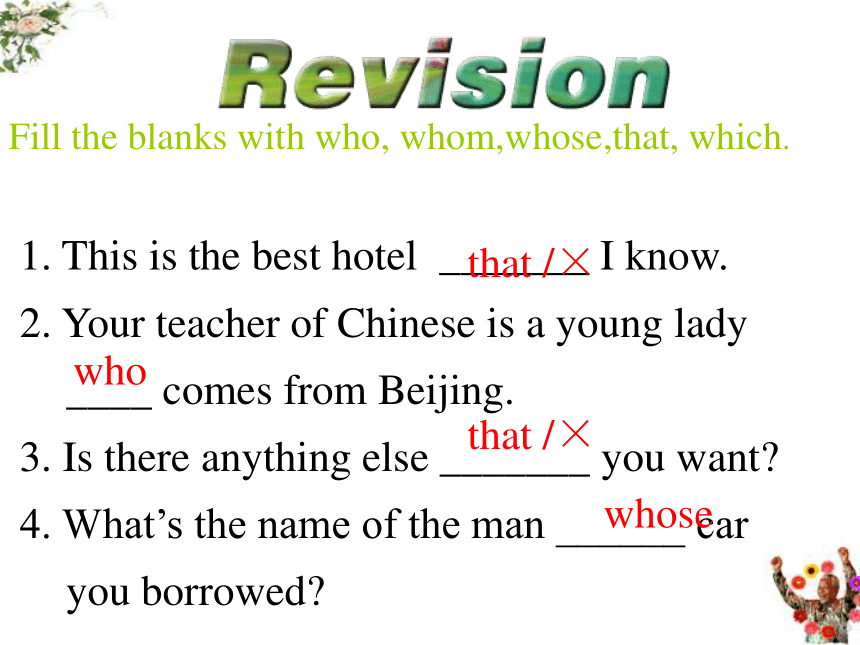
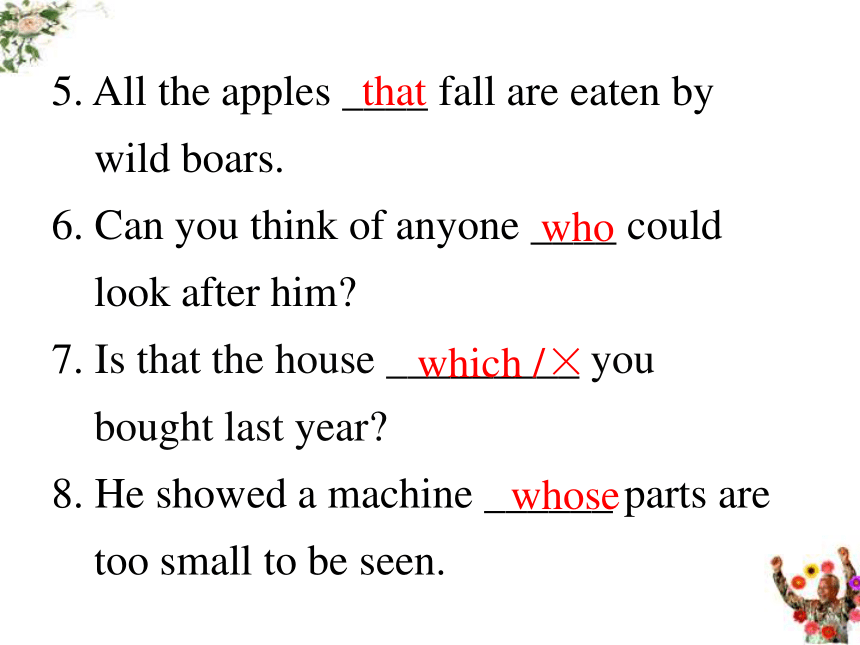
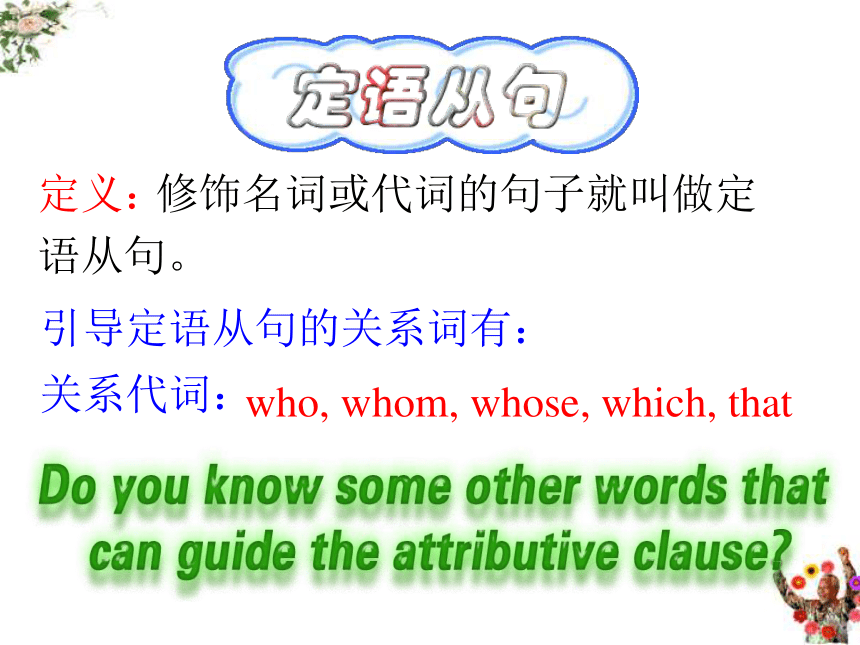
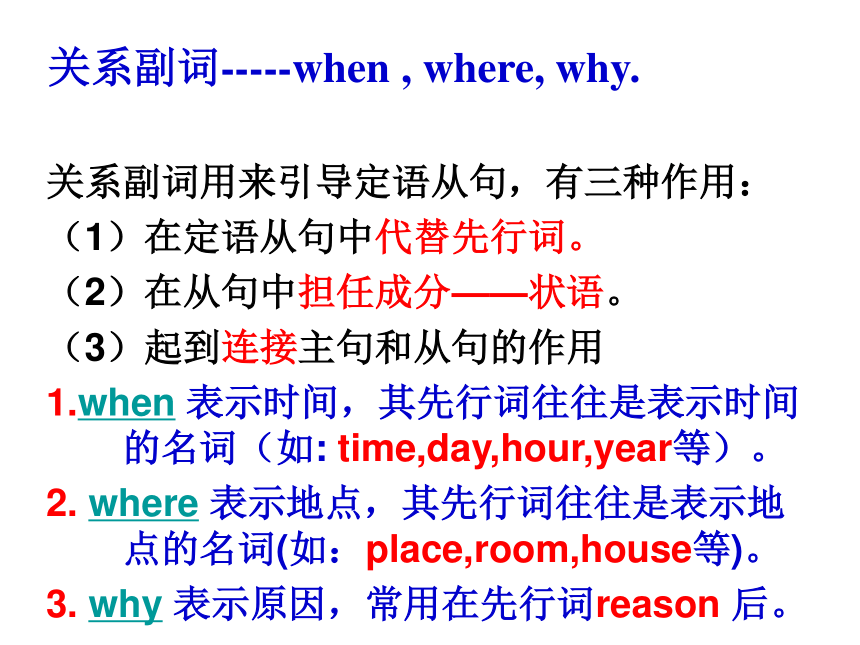
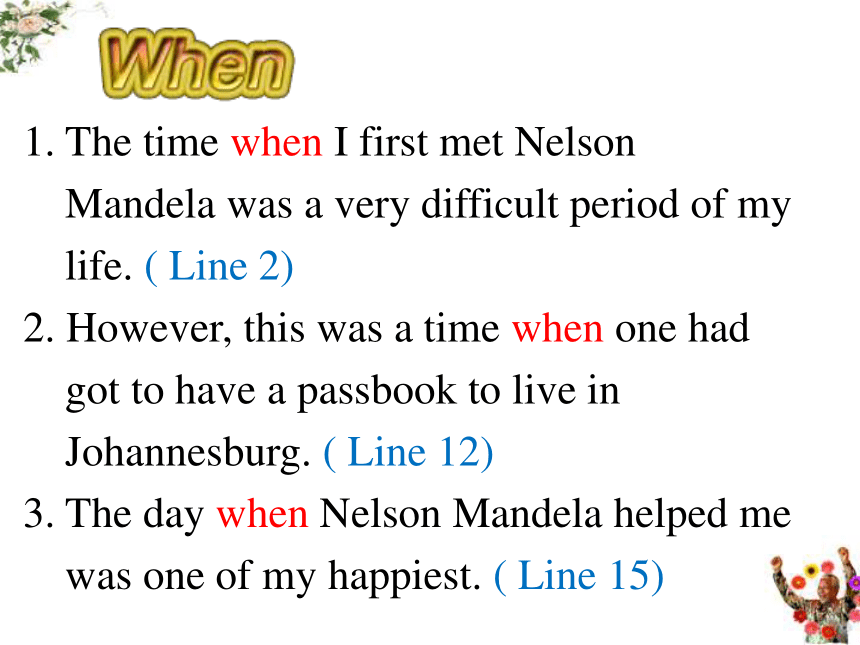
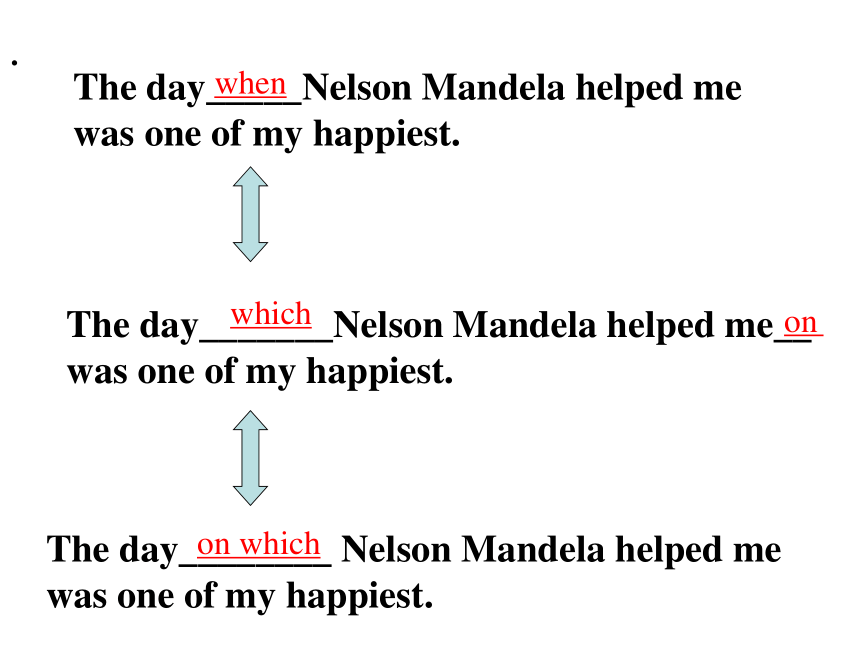
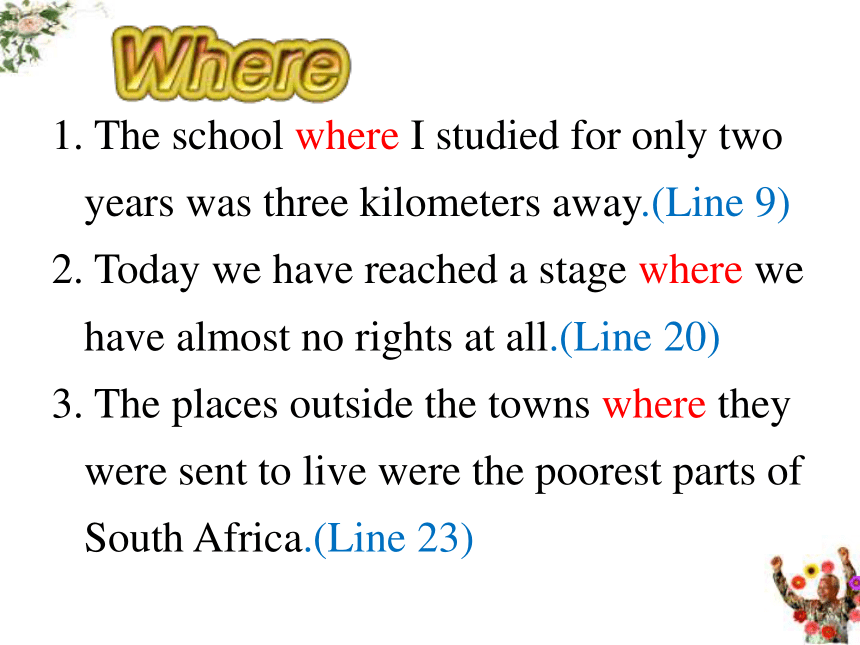
文档简介
课件27张PPT。Unit5 Nelson Mandela
Peroid 5 Grammar
The Attributive Clause Ⅱ
The use of the relative pronoun (关系代词)
口诀: 前看先行词, 辩清人或物
后看从句里, 有无主宾语
1. This is the best hotel _______ I know.
2. Your teacher of Chinese is a young lady ____ comes from Beijing.
3. Is there anything else _______ you want?
4. What’s the name of the man ______ car you borrowed? that /×whothat /×whoseFill the blanks with who, whom,whose,that, which.5. All the apples ____ fall are eaten by wild boars.
6. Can you think of anyone ____ could look after him?
7. Is that the house _________ you bought last year?
8. He showed a machine ______ parts are too small to be seen.thatwhowhich /×whose 修饰名词或代词的句子就叫做定语从句。关系代词:who, whom, whose, which, that 引导定语从句的关系词有:定义:关系副词用来引导定语从句,有三种作用:
(1)在定语从句中代替先行词。
(2)在从句中担任成分——状语。
(3)起到连接主句和从句的作用
1.when 表示时间,其先行词往往是表示时间的名词(如: time,day,hour,year等)。
2. where 表示地点,其先行词往往是表示地点的名词(如:place,room,house等)。
3. why 表示原因,常用在先行词reason 后。关系副词-----when , where, why. 1. The time when I first met Nelson Mandela was a very difficult period of my life. ( Line 2)
2. However, this was a time when one had got to have a passbook to live in Johannesburg. ( Line 12)
3. The day when Nelson Mandela helped me was one of my happiest. ( Line 15).The day_____Nelson Mandela helped me was one of my happiest.The day________ Nelson Mandela helped me was one of my happiest.The day_______Nelson Mandela helped me__
was one of my happiest. when which on on which 1. The school where I studied for only two years was three kilometers away.(Line 9)
2. Today we have reached a stage where we have almost no rights at all.(Line 20)
3. The places outside the towns where they were sent to live were the poorest parts of South Africa.(Line 23) The house which he lives in needs repairing.The house in which he lives needs repairing.The house where he lives needs repairing. Comparing and discovering
The reason why Elias was happy to help Mandela was helping others.The reason for which Elias was happy to help Mandela was helping others.a. This is the place where he works.
This is the place which / that we visited last year.
b. That was the day when he arrived.
Do you still remember the day that/which we spent together?
c. This is the reason why he left.
The reason that/which he gave us was quite reasonable.选择定语从句的关系词一定要看先行词在从句中所做成分。当先行词在从句中作状语,则选择相应的关系 _____。当先行词在从句中作主语, 宾语或表语, 则选择相应的关系 _____。副词代词关系副词的用法时间时间状语地点地点状语原因原因状语Read the sentences below and decide whether they are True or FalseI still remember the days ________ we spent in the country.
I still remember the days ________________ we studied together.
The factory__________ we visited is far away.
The factory ______________ we worked is very modern.
The reason ___________ he gave us is not acceptable.
The reason _____________ he is angry with me is not clear. when when/during which where where/in which why/ for whichwhyThey are in such a situation whicheverything is in disorder.
The police are looking into the case that two VIPs were killed.
Can you make a sentence which this verb can be used in?
They were at the point where/at which they had to decide what to de next.
In the super market, we always see a long queue which people are waiting fir things on sale.
以下名词之后也通常用where/in which引导的定语从句:_____________________, ______________________________, _____ 等等。We were put in a position in which/where we had either to accept we were less important, or fight the government.e.g. This is the point where I don't agree.Pay attention, please!situation, case,positionarticle, sentence, line, word, queuepoint介词+关系代词“介词+关系代词”引导定语从句时,介词的宾语只能用which(指物)或whom(指人),whose即可指人也可指物,即介词+which/whom/whose.1. He was generous with his time, for which I was grateful. (Line 7)
2. The parts of town in which they had to live were decided by white people. (Line22)
3. We were put into a position in which we had either to accept we were less important, or fight the government.(Line 25)关系代词前介词的确定:They’ll never forget July 1 ___________ Hong Kong returned to its motherland.
1992 is the year__________ you were born.小结1:根据先行词的习惯搭配The school ________I was sent was very large.
Hong Kong is the city___________ he comes.小结2:根据定语从句中动词所需习惯搭配Wu Song was the man_________ the tiger was shot.小结3:根据定语从句的意义on whichin which to whichfrom whichby whom 用适当的介词补充完整下列定语从句。
1. I disagree with the facts ______ which your argument is based.
2. The song, ______ which he was interested, will never be heard again.
3. This is the reason ______ which he often comes to school late.
4. I will never forget the way ______ which my teacher taught me.
5. This is the hero ______ whom we are proud. on in forinof6. I want to find the very pen ______ which I wrote that letter.
7. They are the students ______ whom our teachers are thinking highly.
8. It is important to choose good friends ______ whom you can share your feelings and thoughts.
9. It will not be necessary to name the person ______ whom the card belongs.
10. I would always like to do business with those people ________ whom I can rely.withof withtoon / upon即学即练1.The reason ___ he didn’t pass the exam was that he didn’t study hard.
A. which B. in which
C. for which D. of which
2.The school ___ my sister studies at is far from here.
A.where B. that C. at which D. in which
3.the days are gone forever ___ we used foreign oil.
A. when B. that C. which D. at which
4.My hometown is no longer the place ___ it used to be.
A. that B. what C. where D. as5.He was the only one of the boys who ___ late for school.
Are B. were C. is D. was
6.He is the guest ___ the manager first introduced.
Whose B. to whom C. who D. of whom
7.He made a hole in the wall___ he could get onto the house.
A. in which B. which
C. through which D. by which8. After living in Paris for fifty years he returned to the small town ___ he grew up as a child.
which B. where C. that D. when
9.I can still remember the sitting room ___ my brother and I used to sit in the evening.
A. Of which B. which C. that D. where10.We shall never forget the days ___ we worked together.
A. that B. in which C. on which D. which
11. I still remember the year ___ we spent together.
A. / B. when C. on which D. in which
12.I can think of many cases ___ students obviously knew a lot of English words and expressions but couldn’t write a good essay.
A. why B. which C. as D. where
Peroid 5 Grammar
The Attributive Clause Ⅱ
The use of the relative pronoun (关系代词)
口诀: 前看先行词, 辩清人或物
后看从句里, 有无主宾语
1. This is the best hotel _______ I know.
2. Your teacher of Chinese is a young lady ____ comes from Beijing.
3. Is there anything else _______ you want?
4. What’s the name of the man ______ car you borrowed? that /×whothat /×whoseFill the blanks with who, whom,whose,that, which.5. All the apples ____ fall are eaten by wild boars.
6. Can you think of anyone ____ could look after him?
7. Is that the house _________ you bought last year?
8. He showed a machine ______ parts are too small to be seen.thatwhowhich /×whose 修饰名词或代词的句子就叫做定语从句。关系代词:who, whom, whose, which, that 引导定语从句的关系词有:定义:关系副词用来引导定语从句,有三种作用:
(1)在定语从句中代替先行词。
(2)在从句中担任成分——状语。
(3)起到连接主句和从句的作用
1.when 表示时间,其先行词往往是表示时间的名词(如: time,day,hour,year等)。
2. where 表示地点,其先行词往往是表示地点的名词(如:place,room,house等)。
3. why 表示原因,常用在先行词reason 后。关系副词-----when , where, why. 1. The time when I first met Nelson Mandela was a very difficult period of my life. ( Line 2)
2. However, this was a time when one had got to have a passbook to live in Johannesburg. ( Line 12)
3. The day when Nelson Mandela helped me was one of my happiest. ( Line 15).The day_____Nelson Mandela helped me was one of my happiest.The day________ Nelson Mandela helped me was one of my happiest.The day_______Nelson Mandela helped me__
was one of my happiest. when which on on which 1. The school where I studied for only two years was three kilometers away.(Line 9)
2. Today we have reached a stage where we have almost no rights at all.(Line 20)
3. The places outside the towns where they were sent to live were the poorest parts of South Africa.(Line 23) The house which he lives in needs repairing.The house in which he lives needs repairing.The house where he lives needs repairing. Comparing and discovering
The reason why Elias was happy to help Mandela was helping others.The reason for which Elias was happy to help Mandela was helping others.a. This is the place where he works.
This is the place which / that we visited last year.
b. That was the day when he arrived.
Do you still remember the day that/which we spent together?
c. This is the reason why he left.
The reason that/which he gave us was quite reasonable.选择定语从句的关系词一定要看先行词在从句中所做成分。当先行词在从句中作状语,则选择相应的关系 _____。当先行词在从句中作主语, 宾语或表语, 则选择相应的关系 _____。副词代词关系副词的用法时间时间状语地点地点状语原因原因状语Read the sentences below and decide whether they are True or FalseI still remember the days ________ we spent in the country.
I still remember the days ________________ we studied together.
The factory__________ we visited is far away.
The factory ______________ we worked is very modern.
The reason ___________ he gave us is not acceptable.
The reason _____________ he is angry with me is not clear. when when/during which where where/in which why/ for whichwhyThey are in such a situation whicheverything is in disorder.
The police are looking into the case that two VIPs were killed.
Can you make a sentence which this verb can be used in?
They were at the point where/at which they had to decide what to de next.
In the super market, we always see a long queue which people are waiting fir things on sale.
以下名词之后也通常用where/in which引导的定语从句:_____________________, ______________________________, _____ 等等。We were put in a position in which/where we had either to accept we were less important, or fight the government.e.g. This is the point where I don't agree.Pay attention, please!situation, case,positionarticle, sentence, line, word, queuepoint介词+关系代词“介词+关系代词”引导定语从句时,介词的宾语只能用which(指物)或whom(指人),whose即可指人也可指物,即介词+which/whom/whose.1. He was generous with his time, for which I was grateful. (Line 7)
2. The parts of town in which they had to live were decided by white people. (Line22)
3. We were put into a position in which we had either to accept we were less important, or fight the government.(Line 25)关系代词前介词的确定:They’ll never forget July 1 ___________ Hong Kong returned to its motherland.
1992 is the year__________ you were born.小结1:根据先行词的习惯搭配The school ________I was sent was very large.
Hong Kong is the city___________ he comes.小结2:根据定语从句中动词所需习惯搭配Wu Song was the man_________ the tiger was shot.小结3:根据定语从句的意义on whichin which to whichfrom whichby whom 用适当的介词补充完整下列定语从句。
1. I disagree with the facts ______ which your argument is based.
2. The song, ______ which he was interested, will never be heard again.
3. This is the reason ______ which he often comes to school late.
4. I will never forget the way ______ which my teacher taught me.
5. This is the hero ______ whom we are proud. on in forinof6. I want to find the very pen ______ which I wrote that letter.
7. They are the students ______ whom our teachers are thinking highly.
8. It is important to choose good friends ______ whom you can share your feelings and thoughts.
9. It will not be necessary to name the person ______ whom the card belongs.
10. I would always like to do business with those people ________ whom I can rely.withof withtoon / upon即学即练1.The reason ___ he didn’t pass the exam was that he didn’t study hard.
A. which B. in which
C. for which D. of which
2.The school ___ my sister studies at is far from here.
A.where B. that C. at which D. in which
3.the days are gone forever ___ we used foreign oil.
A. when B. that C. which D. at which
4.My hometown is no longer the place ___ it used to be.
A. that B. what C. where D. as5.He was the only one of the boys who ___ late for school.
Are B. were C. is D. was
6.He is the guest ___ the manager first introduced.
Whose B. to whom C. who D. of whom
7.He made a hole in the wall___ he could get onto the house.
A. in which B. which
C. through which D. by which8. After living in Paris for fifty years he returned to the small town ___ he grew up as a child.
which B. where C. that D. when
9.I can still remember the sitting room ___ my brother and I used to sit in the evening.
A. Of which B. which C. that D. where10.We shall never forget the days ___ we worked together.
A. that B. in which C. on which D. which
11. I still remember the year ___ we spent together.
A. / B. when C. on which D. in which
12.I can think of many cases ___ students obviously knew a lot of English words and expressions but couldn’t write a good essay.
A. why B. which C. as D. where
